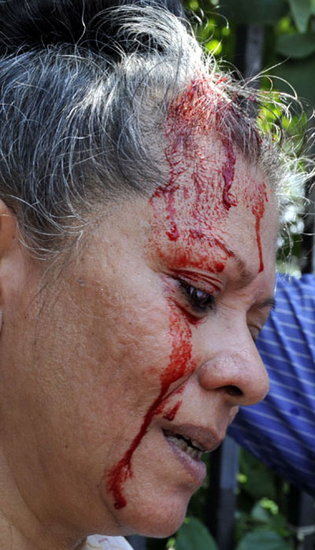Documentary Film by Nasrin Siraj Annie
Duration: 23 Min.
Research, narration and direction: Nasrin Siraj Annie
Subject: Social movement against the establishment of an open pit coal mine in Northwest of Bangladesh.
Venue: Drik Gallery
Address: H# 58, R# 15A (new), Dhanmondi R/A
Date: 28 August, 2012
Time: 5:30 p.m
You are cordially invited
Article by Annie in Prothom Alo
??????????? ?????????????? ???????? ????? ????? ???? ???? ?????? ???? ??? ???? ?????????? ????????????? ????? ????????? ????? ????????????? ?? ???? ???? ???????? ??? ???? ??? ?? ?????? ????? ????? ????? ?????? ????? ???? ??????? ?????? ?????????? ??????? ??? ???????? ? ??????? ????? ?????? ????????? ?????????? ????? ?????? ???????; ???????? ????????????? ???????? ??? ?????????????? ????? ??? ????????? ?????????? ???? ?????? ????? ?? ????, ????? ???? ??? ??? ???????? ????, ????????? ?????????? ?????? ???????? ??????? ???????? (????: ?????) ?????? ??????? ???? ???? ????? ??? ????? ??????? ?? ??????? ????? ??????? ???? ??????? ??? ????????? ???????? ????????? ?????????? ????? ??????? ??? ???????????? (??????)? ?????????? ?????????? ?????? ??????? ??? ? ???????? ??????? ?????????? ??????? ????????? ?? ??? ????? ???? ?????????? ?????????? ????? ??????? ???? ?????? ??? ??????? ??????? ??????????? ???, ??????????? ?????? ???? ??? ??????? ?????????? ???, ?? ????? ?????? ?????? ????????? ???????? ???????? ???, ?? ??? ??? ?????? ?????? ??? ??????? ?? ????? ??????? ????? ?????? ??? ???? ?? ????? ???? ??????? ???? ???? ????? ??????? ??? ????? ?????? ??????? ???? ???, ????? ??? ?????????? ???? ????? ?????? ????????????? ?????????
??????? ????? ??? ?? ????? ????, ???????, ??? ????????, ??????, ???, ??????????, ???????????, ?????-?????, ????????? ? ??????????? ???????????? ????? ?????? ??????? ????? ???? ??? ?????? ???? ??? ???, ????????? ?????? ??? ?????? ?????????? ?? ???? ?????????? ????????? ????? ?? ????? ??????? ???? ????? ?????? ?????? ????? ???????? ????????? ? ??????? ?????? ??????????? ????? ??? ???? ??? ??? ???? ??????? ????????? ???, ??????? ????????? ???? ????-????-????? ??????? ??? ???????? ???? ???? ???? ??? ???? ???? ?????????? ???????? ????????? ?????? ??????? ???? ????? ??? ????? ??????? ??? ?? ????? ?????? ?????? ?????? ????? ??? ???????? ???? ???? ????????? ???????? ???? ???? ???, ??? ???? ???? ????? ?????, ?????? ???? ????? ??? ???? ?????? ??? ???
????? ????????? ??? ? ??? ??? ???????? ?????????? ???? ???????? ? ???????????? ???????????????? ????????? ??? ????????? (??-?? ?????) ???? ??????????? ??????? ??? ???? ?????? ??? ??????? ????? ??????? ???????? ????? ??? ???????? ?????? ??? ??????? ????? ???? ? ??????? ?????????? ???? ??? ???? ???? ?? ??????? ?????????? ???? ????? ?????? ???? ????????? ???? ??????? ??? ??????? ???????????? ???? ???? ???????????? ?????????????? ???? ??? ??????? ???? ??? ???? ?? ???????????? ?????????????? ????????? ??? ?????????????? ????????? ????? ?? ??? ????? ??????? ??????? ???? ?????? ????? ?????? ????? ? ?????????????? ? ??? ????????? ??????? ???????????? ???????????? ??????? ????????? ???? ?? ?? ???? ?????? ??? ?? ?????? ???? ???????? ? ???????? ????? ??????? ????????????? ?????? ???? ???? ???? ?????? ?????? ????????? ???? ???????? ?? ???????????? ??????????????? ???????? ???? (????, ?????????, ???? ??????) ????? ?????? ???? ??????, ??? ???? ?????? ??? ???????? ?? ???? ??????????????? ??? ???? ???????? ?? ?????? ???????? ???????? ??????? ????????? ????? ?? ???? ?????????? ??????? ?????? ???????? ???? ?????? ???? ?????? ???? ??????? ??????? ??????????? ????? (????: ????????) ????????? ???? ??????????????? ????? ???????
??????????? ????? ???????? ?? ?????? ??? ??????? ??????? ???? ???? ???? ?? ????? ?? ????? ??????? ??????? ????????? ?????? ???? ???? ?????? ??????? ????? ?? ?????? ????? ???????? ????? ???????? ??????????? ???????????? ???????????????? ?????? ??????? ???? ?????, ????? ??? ?? ??????? ??? ????? ??????? ???? ?????????? ???? ?? ????? ???? ?????? ??????? ???????? ???????? ????? ??? ??????? ????? ?? ??? ???? ?????? ?????????? ???? ?????????? ?????? ???? ??????? ?? ????? ???????? ????? ????????? ?????????? ???? ?????????? ???????? ???????? ????????? ??? ???????? ???????????? ???????????????? ???????? ?????, ?????? ?????? ??? ??? ?????? ?????? ????? ????????? ??????? ???????? ?????????????? ???? ?????? ????? ?? ??? ??? ?????? ????? ????? ???? ?????? ??????, ?????????? ????? ?????? ??????, ??? ????????? ?????? ?????????? ??????? ??? ???? ????????? ???? ????? ????????????? ??????????? ?????? ????? ????? ?????????? ????, ??????? ??????? ???? ??? ???????? ??? ???? ????? ???? ??????-????????? ??, ???????, ????????? ????????? ???? ????
??? ?????? ??????????, ?????? ??????? ?????, ?????? ????? ???????? ??????? ?????? ???? ??, ????? ?????? ??????? ???????? ??????? ??? ???? ??????? ????? ???????? ???? ?? ????? ??????? ???? ???? ????????? ???????? ????????, ????? ??? ???? ??????? ????? ??????? ????????????? ????? ????? ????? ??????????? ???? ????? ??? ?????? ????, ???? ?????? ???? ??? ???? ??????????? ????? ?????? ??? ?? ???? ??????????????? ??????? ???? ???? ?????????? ??? ???? ???? ???? ?? ????? ????? ???????????, ???? ??????? ????? ????? ????, ????? ??????? ????? ??? ????????? (????: ???????????? ??????????????, ????????? ??????????????) ?????? ???? ??? ??????? ??????? ????? ???, ?????????? ????? ??? ?? ???? ??????????? ?????? ?????? ?????? ???? ???????? ???, ??????????? ??? ??????????? ????? ??????? ??? ?????????????? ???????? ???? ??????, ????? ?????? ?????? ????????? ??? ???? ??????? ?? ??? ???? ????? ????? ??????? ?????? ???? ?? ???? ????? ?????? ??? ??? ????? ?????? ?? ????????? ?? ????? ?? ??? ????, ????? ??? ??????
?????? ?????: ?????????? ? ?????????????? ?????????
Related links:
Phulbari resistance blog
You cannot eat coal
Long March
Profits versus the poor

